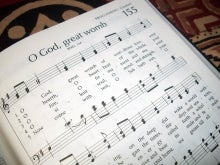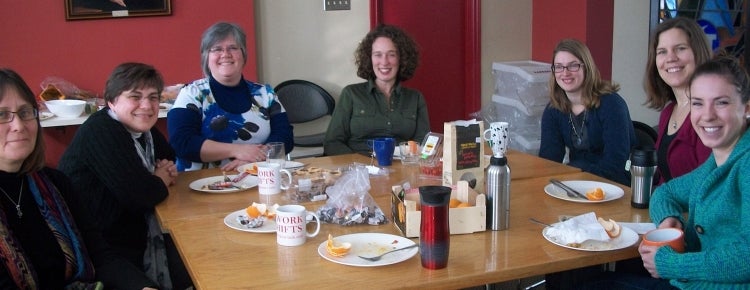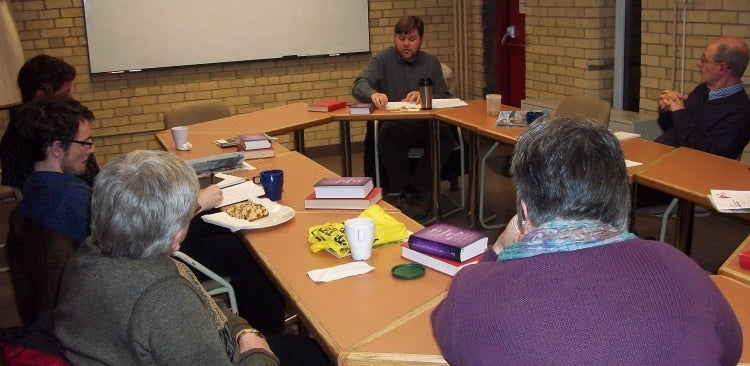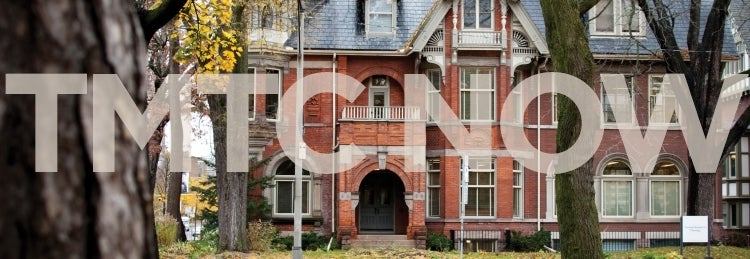
Joining the Mennonite Scholars at AAR/SBL
by Susanne Guenther Loewen
In November 2012, I traveled to Chicago to attend my first American Academy of Religion/Society of Biblical Literature annual meetings. Since these are large-scale and potentially-overwhelming gatherings, I was glad to start my AAR weekend with the Mennonite Scholars and Friends reception, which is one of two Mennonite events coordinated by TMTC. The reception provided a wonderful opportunity to reconnect with former and current professors of mine, to hear about new projects underway among Mennonite scholars from across North America, and to put faces to the names of Mennonite scholars whose work has nourished my own recent research.
The Mennonite Scholars and Friends forum focused on “Judgment and Wrath of God,” which the panelists approached in distinct ways. Derek Suderman challenged the Mennonite tendency to dismiss the Old Testament violence of God, Mary Schmitt explored notions of divine wrath and peace in Romans, Grant Poettcker differentiated God’s ordering justice from capriciousness using Anselm and Rene Girard, and Justin Heinzekehr drew on process and Mennonite theologies to depict God transforming conflict nonviolently through reconciliation. Though all insightfully shed light on the theme, I was left questioning the low Christology underlying much Mennonite theological discourse. In our enthusiasm to depict Jesus as a human ethical model (which grounds our “orthopraxy,” to use Mary Schertz’s term), are we neglecting the implications of the Incarnation for our image of God? As I wrestle with this and other questions in my own research, I look forward to many more opportunities to interact with other Mennonite scholars at the AAR.
D.Min. Thesis Abstract: “Understanding Men’s Experience of God: How Men Experience God in an Urban Mennonite Congregational Setting and Beyond”
by Scott Brubaker-Zehr
Set in the context of Canadian Mennonite urban congregations of European ancestry, this qualitative research study explores men’s experience of God. Men were asked in open ended interviews to describe how they have encountered what they consider to be God in the context of their congregation and beyond. They were asked to reflect in relation to personal life events instead of abstract ideas. Employing grounded theory methodology, the author learned that the majority of men consider God to be an indefinable mystery. For the most part, they did not describe their experience of God in explicitly Christian, Biblical or theological terms. They spoke primarily about their awareness of unmerited goodness and their desire to live moral lives. The author proposes a theory for how the men experience God and reflects on the implications of this theory for the pastoral task of nurturing a specifically Christian, Mennonite spirituality.
Scott Brubaker-Zehr successfully defended his D.Min. thesis in March, 2013. Congratulations, Scott!
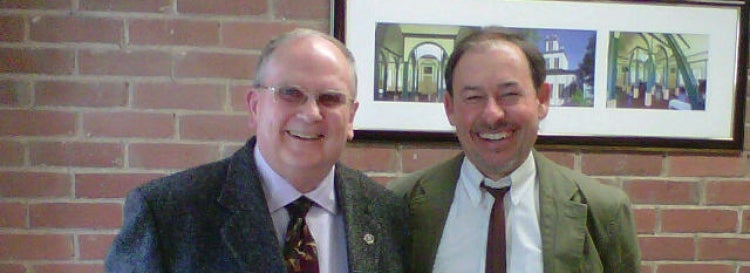
TMTC Women’s Group 2012/13
by Michele Rae Rizoli
For the past three years, every so often some of us Mennonite women who are current or former TST students gather for a time of conversation and mutual support. We juggle our jobs, academic work, childcare, church commitments, and commuting schedules to create a small space where we can connect and mull over our unique challenges. Our meetings provide a counterpoint to the structures and deadlines of the university environment.
This term, we’ve continued with meetings, a potluck, and on March 7, we decided to host a worship service to mark International Women’s Day. About 20 people were present, both men and women of many ages. The service, open to all of the TST, was called “God of the Women.” In the tradition of earlier feminist worship gatherings it retold the stories of women in the Bible and conjured feminine images for God in hymns and readings. A highlight was a litany of naming (written by Denise J.J. Dijk), the ending of which sums up the event:
All women in the church, our sisters
How good it is to claim you.
For you are our tradition of prophets, disciples, ministers.
The first of a cloud of witnesses to the work of the Holy Spirit.
We thank you for your faithfulness.
TMTC women's group gathered for a potluck
Extracurricular Learning: My Experience with Bridgefolk
by Andrew Martin
As a Mennonite interested in historical spiritual theology I knew that the Catholic tradition was the place to be and it attracted me to TST and Regis College. This led to a rich learning experience; however, as a commuting student I found little time to experience Catholic life firsthand. This changed in 2010 when Susan Kennel Harrison convinced me to attend a Bridgefolk conference.
Though I have little ecumenical knowledge, I think it is safe to say that Bridgefolk is unique in its grassroots approach. It brings together Mennonites and Catholics who have an interest in each other’s tradition and seeks commonalities through friendship. The annual conference seeks to foster an organic and wholistic process that is intellectually rigorous, but provides the opportunity to engage the entire person. It does this through keynote speakers and holy experiments – worship and ritual – with time given for dialogue and personal reflection.
This has introduced me to such things as lectio divina, the liturgy of the hours, and a new appreciation of my own tradition’s footwashing ritual. More recently we have experimented with a double Eucharist, Mennonite and Catholic side by side, which came through the influence of the late Margaret O’Gara. More than anywhere else Bridgefolk has brought me into a process of honest, intense, yet gracious dialogue, which tangibly wrestles with how to live and think faithfully as a Christian.
As a board member and conference planning committee member I invite you to experience Bridgefolk 2013, July 25-28 at Conrad Grebel University College. The theme is “Reconciliation: A Way to Peace” and it should be of special interest to TST students and graduates that our keynote speakers are our own John Rempel and Christian McConnell from St. Michael’s College. As information and registration become available it will be posted at www.bridgefolk.net.
TMTC Faculty Involvements
TMTC-related faculty have been involved in academic life at TST and beyond in numerous ways:
Lydia Neufeld Harder has been co-director of a thesis and member of a defence committee for another thesis. She will also be the AMBS commencement speaker on May 25.
Jeremy Bergen is a member of a comprehensive exam committee and was the keynote speaker at the TST Advanced Degree Students’ Association conference in March 2013.
Arnold Snyder, professor emeritus of Anabaptist history at Grebel, is a member of comprehensive exam committees.
John Rempel, TMTC director, is a member of two dissertation committees, member of a defence committee, and member of a comprehensive exam committee. He will also be one of two keynote speakers at Bridgefolk this year.
One of the scholar's forums held at TMTC this year
Upcoming Courses with TMTC director John Rempel
The Eucharist/Lord’s Supper in Ecumenical Perspective
(BD/AD, Fall 2013, preferred time Thurs. 4-6)
A historical and theological study of the development of Eucharistic thought and worship in the West, with some reference to the East. Particular attention will be paid to twentieth-century attempts to reconsider theological, liturgical, and political considerations that have divided the church on the source of its unity. The course uses a seminar format, in which class members have read the assigned readings and are able to join in their analysis under the guidance of the professor.
Theologizing in the Anabaptist-Mennonite Tradition
(BD/AD, Winter 2014, preferred time Thurs. 4-6)
A survey of defining theological, ethical, and spiritual writings in sixteenth-century Anabaptism and its descendent movements, especially Mennonites. It offers an understanding of the religious and cultural forces that have shaped this tradition, focusing especially on the flowering of North American Mennonite theology throughout the twentieth century and of global Mennonite theology after 1975. The course will proceed in a modified seminar format with an introductory lecture to each day’s topics.
Call for Papers
Wading Deeper: Anabaptist-Mennonite Identities Engage Postmodernity
The theme of this, the sixth Graduate Student Conference initiated by the Toronto Mennonite Theological Centre, reflects the idea of current Anabaptist-Mennonite scholars taking “acculturation” one step further, wading into the messiness of “the world” through the recognition and exploration of multiple voices, contexts, and identities among Anabaptist-Mennonites. Signs of this reality are apparent in academia: perhaps more than ever before, Anabaptist-Mennonite scholars can be found in every discipline in public universities. The reverse is also true: Mennonite colleges and universities are diversifying their programmes beyond the disciplines of Bible, theology, and music alone, revealing that Anabaptist-Mennonite scholars are deeply engaging the “waters” in which we find ourselves. In that spirit, this conference seeks to explore the cutting edge(s) of Anabaptist-Mennonite thought through inviting Mennonite and like-minded graduate students to present their academic research in a collegial interdisciplinary context. Participation of students from a wide variety of disciplines is encouraged.
As part of the conference this year, we are pleased to announce a keynote speaker who has joined the Mennonite academy relatively recently. Peter Dula is Associate Professor of Religion and Culture at Eastern Mennonite University in Harrisonburg, Virginia. After receiving a Ph.D. from Duke University in theology and ethics in 2004, he worked as the Mennonite Central Committee Iraq Program Coordinator before coming to EMU in 2006.
Possible paper topics include but are not limited to the following:
- Mennonitism as mono-cultural vs. multi-cultural and multi-ethnic – Germanic heritage(s) and new Anabaptist visions
- Unity and multiplicity in Mennonite theology and ecclesiology – one doctrine, many theologies?
- Interreligious and interdenominational Mennonite dialogues as a form of peacemaking (Mennonite-Muslim dialogue, Mennonite-Catholic dialogue, Lutheran apology to Mennonites, parallels between Mennonite and Jewish experiences)
- Mennonite political allegiance(s) – identities of dissent and protest, adult baptism as a subversive political/theological act, nonconformity and radicality. Can include Mennonite intersections with feminist, liberationist, and queer theologies/theories.
- Mennonite peacemaking – from nonresistance to conscientious objection and nonviolent responsibility (development, mediation, reconciliation, etc.)
- Persecutions, both real and remembered – global Mennonite suffering and martyrdom, past and present
- Etc.
Possible disciplines: theology, biblical studies, ethics, philosophy, religious studies, sociology, diaspora studies, history, literature, musicology, international development studies, peace and conflict transformation studies, etc.
The conference will take place May 30 to June 1, 2014 at Canadian Mennonite University, Winnipeg, Manitoba.
Please send paper proposals of maximum 300 words to mennonite.centre@utoronto.ca by January 15, 2014.
TMTC A. James Reimer Award
TMTC is accepting applications for the 2013/14 A. James Reimer Award, established by alumnus Alan Armstrong in honour of the late founder of TMTC. Nominations are made by the TMTC Advisory Board and recommended to the Conrad Grebel University College Scholarships and Bursaries Committee. Preference will be given to the following:
- Advanced degree students who are currently enrolled at a TST member college or affiliate college. Graduate students at the University of Toronto may also apply for this award.
- Students who are actively involved in the TMTC program.
- Students who have demonstrated commitment to the life of the Mennonite Church and its institutions.
- Students who demonstrate solid academic ability (transcripts required) and academic achievement (curriculum vitae required).
Letters of intent should be forwarded to John Rempel, Director of TMTC. The annual award will be approximately $9,000.
Please see our website for application instructions.
TMTC Updates and Announcements
Susie Guenther Loewen became involved with Toronto Mennonite Theological Centre as soon as she began her doctoral studies at the Toronto School of Theology. I am grateful for Susie's willingness to accept the role of graduate assistant at the Mennonite Centre for my first year as director. She has ably attended to many organizational and bureaucratic matters. Even more important have been the weekly planning sessions in which we mulled over programming needs and possibilities. In an institute this small a partner to think with and implement with is essential. Thank you, Susie, for doing that. Susie is moving on to her third comp and to motherhood.
Lydia N. Harder has been with TMTC longer than anyone else. In the early nineties, as a doctoral student, she helped Jim Reimer make the dream of this Centre into a reality. Since then she has spent years as director and a professor. She continues to sit on doctoral committees and to participate in events we sponsor, as well as sharing an intentional interim ministry with her husband Gary. In acknowledgement of Lydia's many contributions she now has the title of honourary associate.
Congratulations to Rene Baergen who passed his dissertation defence on April 8, 2013. He completed his dissertation, entitled “Re-Placing the Galilean Jesus: Local Geography, Mark, Miracle and the Quest for Jesus of Capernaum,” was under the direction of Dr. Leif Vaage of Emmanuel College at the Toronto School of Theology.
TMTC is looking for a GRADUATE STUDENT ASSISTANT for 2013-14. The assistant works with the director in creating program and in carrying it out, including computer work and limited record keeping. The position is a maximum of 10 hours per week at $17. Please contact John Rempel at mennonite.centre@utoronto.ca or 416-780-9013 by May 15. Ideal starting date is August 15.
